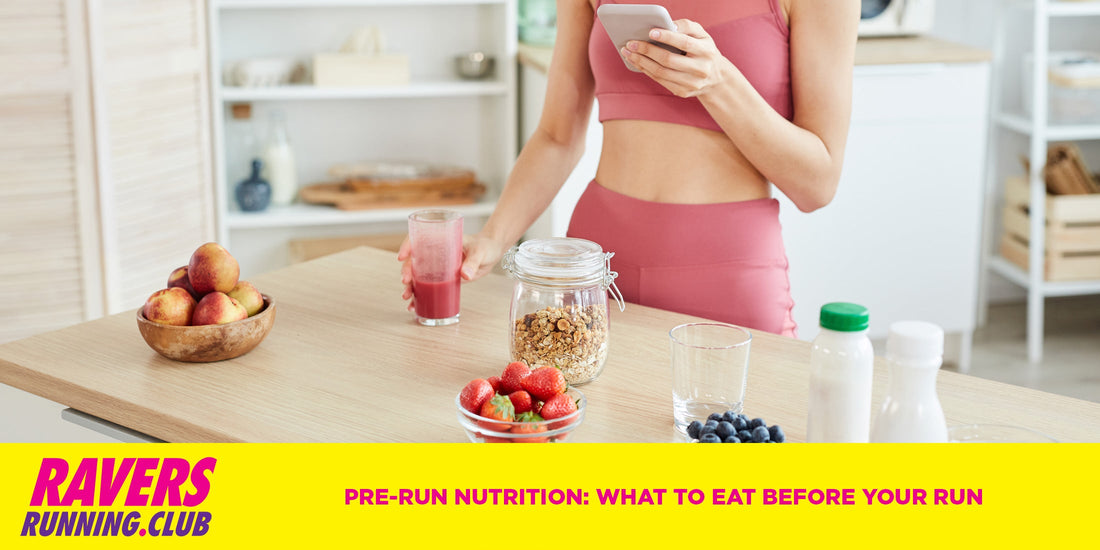
Pre-Run Nutrition: What to Eat Before Your Run
Share
Fuel up the right way and maximise your running performance! Here’s a guide to what you should eat before your run to keep your energy levels high and your stomach happy.
Introduction
Ever wonder what the best foods are to eat before a run? Pre-run nutrition can make a big difference in how you feel and perform on your runs. Eating the right foods at the right time can give you the energy you need, prevent fatigue, and even help avoid stomach discomfort.
In this guide, we’ll break down what you should eat before running, when to eat it, and some easy pre-run snack ideas.
Why Pre-Run Nutrition Matters
Your body needs fuel to perform, and what you eat before your run provides the energy your muscles use to keep going. The right balance of carbohydrates, protein, and hydration can make a significant impact on your stamina and overall performance.
Benefits of Eating Right Before a Run:
- Sustained Energy: Proper nutrition keeps your energy levels steady and prevents you from hitting the dreaded “wall.”
- Muscle Support: A bit of protein before a run can help reduce muscle damage, especially for longer runs.
- Improved Focus and Endurance: Balanced nutrition helps you stay mentally sharp and maintain endurance throughout your run.
What to Eat Before Your Run
-
Carbohydrates
- Carbs are your body’s preferred source of energy for running. Focus on easy-to-digest carbs that won’t upset your stomach.
- Examples: Bananas, toast with jam, oatmeal, or rice cakes.
-
Protein
- A small amount of protein can help stabilise your blood sugar levels and support your muscles.
- Examples: A spoonful of peanut butter, a boiled egg, or a small portion of Greek yogurt.
-
Healthy Fats (in moderation)
- Fat takes longer to digest, so keep it minimal if you’re running soon. However, small amounts of healthy fats can be beneficial for longer runs.
- Examples: Avocado slices or a handful of nuts (if you have at least an hour before running).
Focus on simple, easily digestible foods that won’t sit heavy in your stomach.
Timing Your Pre-Run Meal
3-4 Hours Before a Run:
- If you’re eating a full meal, give your body enough time to digest. A balanced meal with carbs, lean protein, and healthy fats works well.
- Example: Chicken and rice, a pasta dish, or a veggie and quinoa bowl.
1-2 Hours Before a Run:
- A light snack or small meal with mostly carbs and a bit of protein is ideal. Keep it simple and easy to digest.
- Example: A smoothie, a granola bar, or a small bowl of oatmeal.
30 Minutes to 1 Hour Before a Run:
- Opt for a quick snack that’s primarily carbs. This will top off your glycogen stores without weighing you down.
- Example: A banana, a piece of toast, or an energy gel.
Hydration Is Key
Don’t forget to hydrate! Drink water throughout the day, and have a small glass about 30 minutes before your run. If you’re running for more than an hour, consider a sports drink to replenish electrolytes.
Pre-Run Snack Ideas
- Banana with Peanut Butter: A perfect mix of carbs and a bit of protein.
- Oatmeal with Berries: Easy on the stomach and full of energy-boosting carbs.
- Rice Cake with Honey: Light and easy to digest, great for a quick energy boost.
- Greek Yogurt with a Drizzle of Honey: A small serving provides protein and natural sugars.
- Smoothie: Blend a banana, a handful of berries, and a splash of almond milk for a refreshing pre-run drink.
Foods to Avoid Before a Run
- High-Fiber Foods: Avoid heavy, fiber-rich foods like beans, broccoli, or bran cereals right before running, as they can cause digestive issues.
- Fatty Foods: Burgers, fries, and other greasy foods take longer to digest and may weigh you down.
- Sugary Treats: Candy or pastries may give you a quick energy spike but can lead to a crash mid-run.
Conclusion
Getting your pre-run nutrition right can make a big difference in how you feel and perform on your runs. Experiment with different foods and timing to see what works best for your body. Remember, everyone is different, so it’s all about finding your perfect fuel strategy!
For more running tips and nutrition advice, check out our other blogs and follow us on social media!
